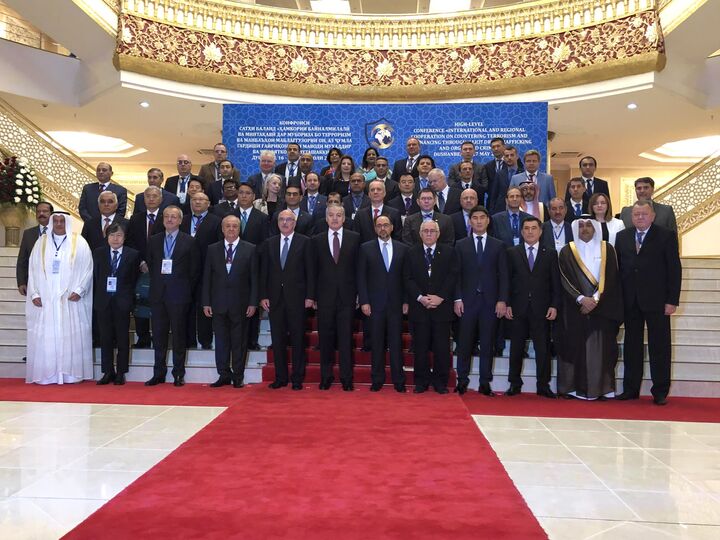Mr President of the Republic of Tajikistan,
Mr Under-Secretary-General of the United Nations,
Heads of delegations, ladies and gentlemen,
Mr Under-Secretary-General of the United Nations,
Heads of delegations, ladies and gentlemen,
1. I join in the words of gratitude to the conference organisers for their hospitality and for creating conditions that are favourable for productive work.
2. The rapidly changing situation in the world has been accompanied in recent years by growing new challenges and threats to regional and international security.
The increasingly cross-border nature of terrorism, extremism and organised crime causes grave concern.
Terrorist groups tend to merge with transnational organised criminal associations, fund their activities through drug trafficking, illegal sale of weapons, illegal migration and laundering criminal proceeds.
The activities of such destructive forces pose a grave threat to the SCO space, as is attested by the recent terrorist attacks in Sri Lanka, a dialogue partner with our Organisation.
We note a growing number of challenges in the Eurasian space caused by drug trafficking from Afghanistan and the Golden Triangle region.
According to some reports, illegal proceeds from drug trafficking exceed $1 trillion.
The attempts of the terrorist organisations in Afghanistan to take total control of drug trafficking in Central Asia are a cause for special concern.
The attempts of the terrorist organisations in Afghanistan to take total control of drug trafficking in Central Asia are a cause for special concern.
At the same time terrorists search for contraband routes that can be used for their purposes, including for deploying their fighters.
3. In this context holding this conference in Dushanbe has special significance given that Tajikistan, a co-founder of the Shanghai Cooperation Organisation and a country that has the longest border with Afghanistan, makes a hefty contribution to preventing and countering threats to peace and stability in the region.
Today, the SCO has truly become an inalienable element of regional and international politics and security.
The SCO's potential has grown measurably since India and Pakistan's accession in 2017.
The SCO stands for boosting efforts to create a united global anti-terrorist front with the UN's central coordinating role, and also for an effective implementation of the respective UNSC resolutions dealing with countering any forms of financing and material support of terrorism.
The SCO stands for boosting efforts to create a united global anti-terrorist front with the UN's central coordinating role, and also for an effective implementation of the respective UNSC resolutions dealing with countering any forms of financing and material support of terrorism.
The SCO Charter and Development Strategy until 2025 identify our Organisation's major priorities as fighting international terrorism, separatism and extremism, illegal trafficking of drugs, weapons and explosive materials, other kinds of organised and transnational crime, as well as illegal migration.
The SCO has adopted around 700 documents in this area, which makes up almost half of the Organisation's total legal base.
The Programme of SCO Member States Cooperation in Combating Terrorism, Separatism and Extremism for 2019-2021 was adopted at last year's Qingdao Summit.
All these documents envision concrete joint measures on countering terrorist and extremist groups, identifying and shutting down the channels of financial support.
The SCO's Regional Anti-Terrorist Structure makes a significant contribution to achieving practical results in fighting the three evils thanks to the active coordination of efforts by the member states.
The SCO Anti-Drug Strategy approved by the heads of state at the Qingdao Summit last year, the Action Plan on its implementation and the SCO Concept for the Prevention of the Abuse of Narcotic Drugs and Psychotropic Substances are all aimed at stepping up multilateral cooperation in combating the drug evil.
It should be noted that the SCO countries seized 40 percent of all narcotics seized in the Eurasian space in the past five years.
In this context, the achieved agreement on setting up an antinarcotics agency within the SCO bears special significance.
Joining the international community's efforts in countering involvement of the youth in terrorist and extremist structures, activities of organised criminal groups and drug abuse, including through the use of the internet, are a topmost priority.
In this respect the SCO member states are carrying out a set of measures to fulfil the provisions of the Joint Appeal of the Heads of State to the Youth and the Action Plan on its implementation so as to establish conditions for self-fulfilment of young people, increasing their spiritual potential and engaging them in entrepreneurial activities.
In April of this year the SCO-Afghanistan Contact Group successfully held its third meeting in Bishkek.
The Roadmap for further actions of the Contact Group is scheduled to be signed at the forthcoming SCO Summit in Bishkek for the sake of ensuring lasting peace, security, fighting terrorism and extremism, curbing drug trafficking, and for sustainable development in Afghanistan.
We see engaging observer states and SCO dialogue partners, and deepening contacts with interested nations and international organisations as an efficient resource for enhancing cooperation in the area of security.
We have garnered a wealth of experience in cooperating with the UN and its agency, the United Nations Office on Drugs and Crime (UNODC), as well as with the Paris Pact Initiative.
Together with the UNODC we consider issues of trilateral consultations and interaction with ASEAN, the OSCE and Interpol to combat terrorism, illegal drug trafficking and cross-border crime.
We express readiness to launch cooperation in this area in the trilateral format of the SCO, UNODC and the European Union.
To conclude, I would like to stress again that the SCO is open to cooperation with all countries and international organisations in order to work out collective and effective approaches to fighting threats and challenges to regional and international security.
I am confident that proposals and initiatives from the participants in today's high-level conference will give a new and effective boost to enhancing multilateral cooperation in combating terrorism and its financing through illicit drug trafficking and organised crime.
Thank you.
